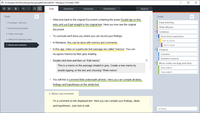F4analyse
|
Main window f4analyse 2.0 | |
| Developer(s) | dr. dresing & pehl GmbH – audiotranskription.de |
|---|---|
| Stable release |
2.0
/ Nov 2016 |
| Operating system | Microsoft Windows, Linux, macOS, Android, iOS |
| Type | Qualitative data analysis, Text analysis |
| License | Proprietary |
| Website |
www |
f4analyse is a software that supports the analysis and interpretation of qualitative data (CAQDAS). The software facilitates the analysis of qualitative text data within the framework of different qualitative methods such as the grounded theory approach, the qualitative content analysis, the documentary method and other interpretative methods.
In contrast to established CAQDAS software like Atlas.ti, MAXQDA and Nvivo, f4analyse has been developed with a reduced amount of functions and fully platform-independent. It is available for Windows, Linux, MacOS and with limited functions for Android and iOS. f4analyse caters to the needs of students at graduate and postgraduate level working on qualitative research projects.
Description
Developed by Thorsten Dresing and Thorsten Pehl, the software is distributed by dr. Dresing & pehl GmbH - audiotranskription.de. From 2000 to 2008, Thorsten Dresing was a research fellow at the University of Marburg where he worked under the supervision of Udo Kuckartz who is the developer of MAXQDA. Thorsten Dresing completed his doctoral dissertation on software-based text analysis.[1] Thorsten Dresing and Thorsten Pehl won the “Hessian Startup Award for Innovative Business Ideas” with the transcription software f4transkript in 2009.[2] f4analyse originated as a further development of this idea. In 2013, it was presented and publicly discussed for the first time at “Berliner Methodentreffen”, which is the largest conference for qualitative research methods in Germany.[3]
f4analyse provides the basic tools for computer-assisted qualitative data analysis. These include hierarchical text coding, writing of memos and comments, selection of quotations, lexical search with automatic coding as well as the export of certain quotations into word processor software. Compared to other CAQDAS programs, f4analyse explicitly reduces the scope of functions. For example, no mixed-method strategies are supported and there are no visualization functions.
The software is mainly used in the context of qualitative research and evaluation.[4][5][6][7][8] f4analyse is under continuous review through the scholarly community.[9] The software has been used for qualitative data analysis in academic research across various disciplines, such as development economics,[10] political science[11] or in the field of software engineering.[12]
Features overview:
- Import of RTF files (e.g. transcripts or reports)
- Linking of audio/video files with the transcripts via time stamps from the transcription software f4transkript (Windows / Linux) or f5transkript (Mac)
- Writing memos (for instance paraphrases and interpretations)
- Coding of texts and creating of a hierarchical code system
- Coding of memos
- Filtering (selection) of quotes from the data
- Lexical search and automatic coding of references (with context)
- Distribution view to display the frequency of codes of all texts
- Summary view for the generation of topic compilations
- Teamwork support (merging of several projects)
- Export of texts into Microsoft Word with automatic reference as RTF file, a profile matrix as CSV file as well as the export of the entire project as MAXQDA (*.mx4) file (Windows only)
See also
References
- ↑ Thorsten Dresing (in German), E-Learning in der universitären Lehre am Beispiel der Entwicklung und Evaluation eines hybriden Onlineseminars zur computergestützten Text- und Inhaltsanalyse mit MAXqda
- ↑ Pressestelle. "Erster Hessischer Gründerpreis für Marburger Start Up - Philipps-Universität Marburg" (in German). Retrieved 2017-03-22.
- ↑ "Berliner Methodentreffen 2013 website". Retrieved 10 March 2017.
- ↑ Walf, J., Nachtwei, J. (2016), Reinhard Beyer; Bodo Krause, Jens Nachtwei, ed., "Empirische Evaluationsmethoden" (in German), Reihe Empirische Evaluationsmethoden (Berlin: ZeE) (20): p. 58
- ↑ Gabriel Ignatow; Drago Radev (2017) (in German), Text mining: A guidebook for the social sciences., Los Angeles: SAGE, p. 80
- ↑ Daniela Weber (2015) (in German), Wissenschaftliches Arbeiten für Wirtschaftswissenschaftler: Untersuchungen planen, durchführen und auswerten., Wiley-VCH
- ↑ Anthony J. Onwuegbuzie, Rebecca Frels (2016) (in German), Seven Steps to a Comprehensive Literature Review: A Multimodal and Cultural Approach, Sage Pub
- ↑ Thomas Meyer (2016), Laura Busse, Wilfried Enderle, Rüdiger Hohls, Gregor Horstkemper, Thomas Meyer, Jens Prellwitz, Annette Schuhmann, ed., "Digitale Werkzeuge - Clio-Guide. Ein Handbuch zu digitalen Ressourcen für die Geschichtswissenschaften" (in German), Historisches Forum (Berlin) (19): p. 32
- ↑ http://www.qualitative-forschung.de/methodentreffen/
- ↑ Karin Schärer: Ressourcenreichtum als Fluch oder Segen: Umgang mit Rohstoffen und Folgen des Ressourcenreichtums in Botswana und Kongo. Springer Gabler 2015.
- ↑ Claudia Bacon: Europa im Rathaus: EU-Arbeit der deutschen Großstädte. Lit Verlag 2016.
- ↑ Carolin Gold-Veerkamp: Erhebung von Soll-Kompetenzen im Software Engineering: Anforderungen an Hochschulabsolventen aus industrieller Perspektive. Springer Vieweg 2016
Notes
- Reinhard Beyer, Bodo Krause, Jens Nachtwei (ed.): Empirische Evaluationsmethoden. Reihe Empirische Evaluationsmethoden, 20. ZeE, 2016.
- Thorsten Dresing, Thorsten Pehl: Computergestützte Analyse qualitativer Daten mit f4analyse. In: Jan Kruse (ed.): Qualitative Interviewforschung. Beltz Juventa, 2014, pp. 614–623.
- Gabriel Ignatow, Drago Radev: Text mining: A guidebook for the social sciences. SAGE, 2017.
- Günter Mey, Katja Mruck (ed.): Qualitative Forschung. Analysen und Diskussionen – 10 Jahre Berlin Methodentreffen. Springer, 2014.
- Süleyman Nihat Şad, Martin Ebner: Digital Tools for Seamless Learning. Advances in Educational Technologies and Instructional Design (AETID) Book Series. Information Science Reference, 2016.
